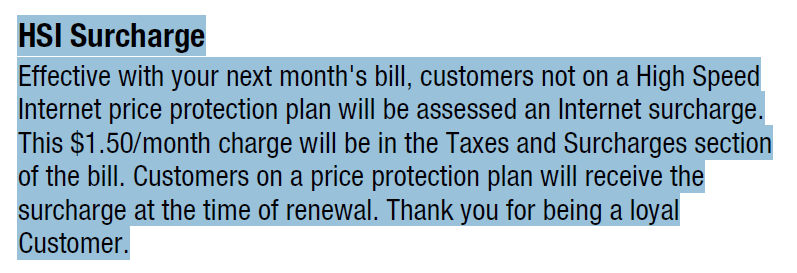
Their prices are sky high.
Back in May 2010, Stop the Cap! launched a debate with a few Wireless Internet Service Providers (WISPs) that provide largely rural America with wireless access to the Internet over long range Wi-Fi networks. The debate got started when Matthew Larsen, who runs the Wireless Cowboys blog, announced the arrival of an Internet Overcharging scheme at his WISP — Vistabeam, which serves residents in rural Wyoming and Nebraska.
WISPs are being increasingly challenged by the changing tastes of Internet customers, who are gravitating towards broadband multimedia content, saturating limited capacity networks and forcing regular infrastructure upgrades to keep up with increasing usage demands. Unlike larger providers, many WISPs are independent, family-run businesses that lack easy access to capital and resources to rapidly respond to demand, especially when most have a rural customer base that numbers in the hundreds or thousands.
That’s one of the reasons why Stop the Cap! has not been as harsh on these providers when they implement usage limit schemes on their customers. Because WISPs provide service where cable and phone companies usually don’t bother to serve, these wireless providers are the only option beyond satellite Internet, which we regularly label “fraudband” for claims of broadband speeds that are rarely delivered. Still, we were not impressed last year with some of Larsen’s language about what his usage caps were intended to do (underlining ours):
I feel that these caps are more than generous, and should have a minimal effect on the majority of our customers. With our backbone consumption per customer increasing, implementing caps of some kind became a necessity. I am not looking at the caps as a new “profit center” – they are a deterrent as much as anything. It will provide an incentive for customers to upgrade to a faster plan with a higher cap, or take their download habits to a competitor and chew up someone else’s bandwidth.
Ouch.
It’s been over a year, and Larsen is back with an editorial patting himself on the back for an Internet Overcharging success story well-implemented:
We have never raised prices on our services. We still have a customer note on the wall that reads “Your bill was the only one I got this month that DIDN’T go up. Thank you!” I would have a hard time raising prices on this person because of their neighbors that are downloading 20x as much. Usage Based Billing is a much fairer way to go, especially when the provider faces so much reinvestment cost to accommodate the heavier users. After the first year of implementation, I am very glad that we took the time to implement it and intend to use the revenue to build a better network for all of our customers.
Larsen is also upset with those who believe in the concept of unlimited Internet:
Operating a broadband network is not free, and it is not a low-maintenance business. I have a group of dedicated employees and subcontractors that have spent a lot of late nights and early mornings away from their families to build and maintain our network. Anyone who thinks that unlimited broadband is a God given right should be forced to spend a few days in my lead tech’s shoes, getting a good look at what a broadband provider has to do to build a network and keep it running.
Larsen, like other WISPs are confronting the reality that Internet usage is on the upswing, and while we sympathize with the challenges faced by Vistabeam and other WISPs, his statements do not apply to every broadband network around. And frankly, an increasing number of customers simply aren’t interested in Larsen’s challenges, especially if another provider can deliver service more cheaply and efficiently. Vistabeam better hope nobody does, because their prices are simply not competitive if just about any other provider manages to work their way into his territory.
Vistabeam prices start at $29.95 a month for 384kbps/128kbps service with a monthly usage limit of 10GB. Exceed that and you will pay an additional $1 per gigabyte. Customers who need more speed pay dearly for it. A tier providing 4/2Mbps service will run you $99.95 a month with a 60GB monthly usage allowance.
As of late, Larsen has been railing against the U.S. Department of Agriculture over recent broadband stimulus awards designed to improve coverage of broadband Internet in the same rural regions of the country Vistabeam serves. He’s upset the USDA has awarded a $10.2 million infrastructure loan to the Hemingford Cooperative Telephone Company, which provides service in western Nebraska under the name Mobius Communications.
 Larsen speaks highly of the fact Vistabeam delivers service in the absence of government funding or stimulus. But average consumers are not likely to care when they compare prices and consider the fact Mobius doesn’t appear to limit customers’ usage.
Larsen speaks highly of the fact Vistabeam delivers service in the absence of government funding or stimulus. But average consumers are not likely to care when they compare prices and consider the fact Mobius doesn’t appear to limit customers’ usage.
Mobius DSL Prices:
- 500kbps – $35.00
- 1.5Mbps – $40.00
- 3Mbps – $50.00
- 5Mbps – $60.00 (Currently available in Alliance and Chadron.)
Mobius charges effectively half the price Vistabeam charges, and offers faster tiers of service in some areas, without fear of overlimit fees. It’s also important to recognize the “award” was actually a “loan,” which must be repaid. Larsen seems less upset with the fact there are broadband stimulus programs than with the reality industry lobbying has effectively cut out many Wireless ISPs from standing any chance of winning one.
I get especially frustrated by loan awards like this one because I have operated two ISPs that have had to compete directly with Mobius and did not have access to any federal grant or loan programs. The USDA Broadband and Loan programs are essentially only available to [regional phone companies]. When I made inquiries into the programs several years ago, I found that they would only loan to a single recipient in a region so that they were not funding competing projects.

Phillip Dampier
For Stop the Cap!, our constituents are consumers interested in obtaining the best possible broadband service at the best price. Larsen’s views, understandable from the perspective of a business owner, would leave a number of consumers paying effectively double the price for usage-limited broadband. That would, however, satisfy a business argument that self-funded private providers should not face competition from other providers that can extend faster, unlimited DSL, cable, or fiber service with low interest loans.
Wouldn’t a better solution be to form a coalition to force open the same beneficial loan programs to Wireless ISPs who can more readily and affordably build up their networks and ease the Internet Overcharging that too often comes along for the ride? We’re not accusing Larsen of gouging his customers for fun and profit, but we would like to see WISPs like Vistabeam develop win-win strategies that deliver success for their innovative efforts and lower priced, faster service for their customers.
The alternative may be the eventual arrival of those rural phone companies, increasingly equipped to deliver faster and cheaper service to Vistabeam’s current customers, eventually spelling disaster to that company’s business plan. It has happened before. Anyone remember the “wireless cable” industry that delivered a few dozen cable channels over microwave signals? That’s a service whose time came and went, largely replaced with satellite television and rural telephone cable TV, better equipped to provide the kind of service consumers actually wanted, but wireless cable was ill-equipped to provide.
 A British physicist has developed a technology that could one day deliver your wireless broadband connection over any ordinary household lamp equipped with a “light emitting diode” (LED) light bulb.
A British physicist has developed a technology that could one day deliver your wireless broadband connection over any ordinary household lamp equipped with a “light emitting diode” (LED) light bulb.

 Subscribe
Subscribe






